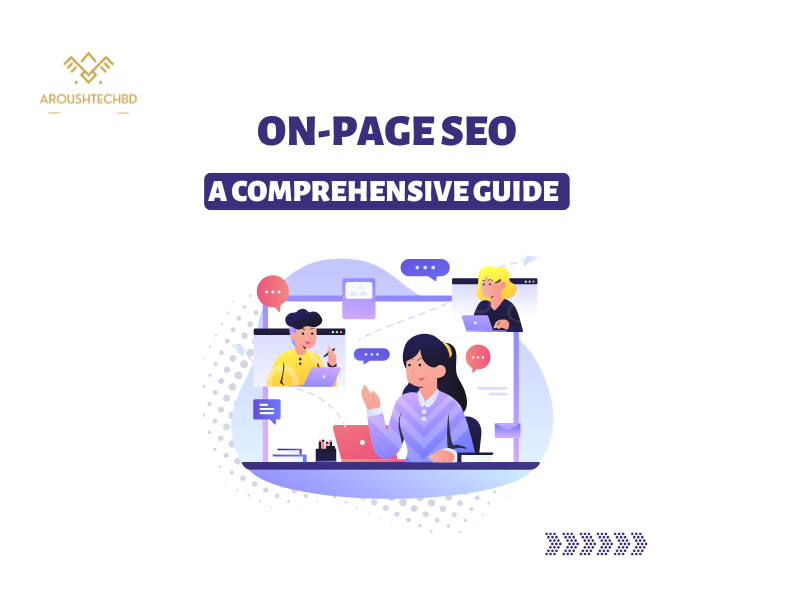In today’s world, it’s becoming more and more difficult to make your site stand out. Even if the content on your website is excellent, it might still gather underwhelming results. In simpler terms, if you want to compete against the big leagues and rise to the top, you need to be different to stand out, which is easily possible by being SEO-friendly.
A great way to do this is with on-page SEO. It’ll enhance the content already on your website and significantly boost its ranking in a browser’s search results.
But that isn’t very easy when you are just starting. That’s why today we are going to discuss on-page SEO, how you can utilize it to boost your website’s results, and much more. Without further ado, let’s get started.
What is on-page SEO?
As the name suggests, on page SEO is a part of SEO optimization that is used to drastically improve your website’s SEO friendliness, which can in turn lead to higher website traffic and a higher overall search engine ranking.
Optimizing the content, title tag, and keyword research are the most significant parts of it; however, that’s not all. the site’s speed, etc. are necessary factors for on-page SEO.
This optimization makes the information on the website understandable, so readers who aren’t familiar with your website’s content won’t get confused.
Why is on-page SEO so important?
The most important thing to comprehend is the main goal of on page SEO and the benefits it may offer your website.
A major goal is to outperform and rank higher than the websites of your competitors. Meanwhile, improve your own website for users and search engines. It will enable the search engine to more accurately judge your website and recognize the question that led the user to it.
Read also: 5 Free Best On Page SEO Tools for WordPress Blog Optimization
How to Optimize a Website Using On-Page SEO
By now, you should know more or less about what on-page SEO is. So, here are some techniques that will drastically help your optimization process—
-
Using a unique title
Your title is the most important part of your website. A person decides to click on a website based on how it relates to what they need. If the title is not optimized and well thought out, it can confuse potential readers and prevent them from entering your website even if the content is world-class.
Always think from your perspective. If you saw the title of a website like yours, would you click it?
Inputting the keyword in the title in a unique way is an excellent idea. It helps users match what they need by searching.
Keep the title within 60 characters so that it doesn’t get cut off.
-
A proper structure of headings
Use headings as h1, h2, h3,… The first heading can be used for the title part, including your main keyword. H2 and H3 can be used as subheadings. This allows reading and navigation to be really simple.
Make sure not to be extremely complex, as it can confuse new readers of the topic.
-
Improvising your website’s URL
Customize your website link into a simpler one rather cryptic, as users tend to find it more intimidating. Use words that help them recognize what the link’s content is about rather than being confused.
Keeping the url simple while also using the keyword helps search engines know what your website is about and can match the related search queries.
Recheck your link after all customizations are done.
-
Optimizing content
Writing optimized content is a really important part of on-page SEO. It should always be of a quality that matches what the reader wants. After clicking by seeing a good title, the readers will expect informative and good-quality writing, so make sure to keep the content very simple, informative yet unique.
Incorporate the keyword into your writing, focusing on the first 100 words or so, but do not overuse it.
Keep the concept very simple so that new readers don’t have problems with understanding.
Though you can use the internet to get ideas for material, you should never blatantly steal ideas from other websites and instead write in your own unique style.
-
Be friendly with mobile devices
Being friendly with mobile devices is crucial, as search engines prioritize mobile optimized websites while ranking. If the website is not optimized for mobile, then it can appear to have a poor rank when searched through mobile. So here is how you can make it mobile friendly.
Adjust the fonts and touch elements according to mobile comfort and also the size depending on the mobile.
Simplify navigation for mobile users
Include all the features of a PC/laptop website in a mobile website.
Always make sure to check your website using mobile tools that search engines offer.
-
Create internal linking
Add the URLs of other pages on your website that might be correlated with on-page SEO.
It will improve site navigation and increase more users towards other pages of your websites.(Enhance user experience)
Make sure to use descriptive anchor text for guiding users to other sites.
Avoid linking too many pages to this page because it can move readers away very quickly.
Tips on Making On-Page SEO More Effective
Now that you have a good idea about how to do on page SEO, you can make it more effective by taking advantage of these tips. They might not seem relevant at first, but this will play a key role in whether you can compete and make it to the top or not.
● Keyword research
Most people don’t realize the importance of keyword research before starting on page SEO. It is the process of identifying and reviewing words or phrases people search for and determining the search volume and website traffic. Doing a proper keyword can help you get an idea of your targeted audience and what they are looking for. Use tools like Semrush and Ahrefs to help your research process.
● Site speed
Nowadays, people have very little patience and leave slow websites within seconds. Search engines picked up on this and have also made this a factor, which is why having a fast-opening site is crucial for on page SEO. The best way to improve site speed is minimizing and removing unnecessary things like images, render-blocking JavaScript, etc. You can always review your website speed using Google’s pagespeed insight, as it will also show the solutions to improve your website speed.
Read also: How to Hire the Right Shopify SEO Expert for Your Online Store
Frequently Asked Questions (FAQs)
Now that you have a decent idea about on-page SEO, you can take a look at some of the most frequently asked questions. These can help clear up further confusion—
-
What are the types of SEO?
There are four types of SEO:
- On-page SEO is the process of optimizing the content on your website in a way that drastically improves their search results.
- Off-page SEO is the process of optimizing outside your website in order to drastically improve their search results.
- Local SEO: Customizing search results so that your website appears more in the local area.
- Technical SEO is ensuring that your website meets the modern requirements after doing SEO optimization.
Read more: Best Affordable Local SEO Services Partner for Small Businesses
-
What is off-page SEO vs on-page?
Anything you do on your website to raise its search engine spot is known as “on page SEO,” whereas “off-page SEO” refers to optimizing your website outside of it through methods like public relations, backlinks, and other strategies.
-
Which tools are the best for on page SEO?
There are great numbers of tools you can utilize, but these are the best among them:
- Semrush is an online software used for getting ahead of your competitors by researching keywords and inspecting your website’s performance in search engines.
- Google Analytics is an official service given by Google to fully optimize your website content and take care of performance metrics; also available in mobile.
- Clearscope: An optimization tool used to improve the website’s traffic
Final Thoughts
By now, you should have a good idea about on page SEO and how to use it for enhancing your website. Do keyword research, boost your page Speed and then proceed to optimize your website using on-page. Following all the steps of optimization is important to optimize your site.
In addition, you should plan out your website’s structure and the ways in which you will improve it using other elements such as better urls, title tags, and so on.
With that being said, good luck with doing on-page.

